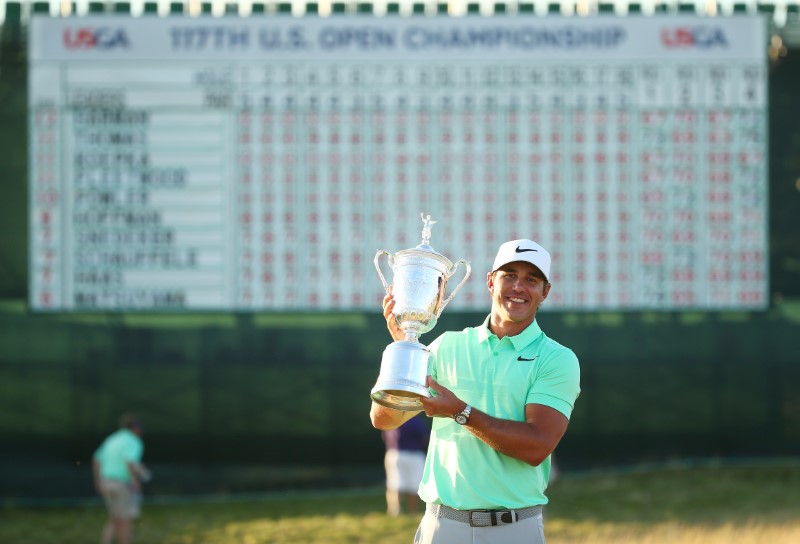By Andrew Both
(Reuters) - Brooks Koepka's U.S. Open triumph on Sunday was the latest reminder of how the sport used to be before Tiger Woods came along and blew away all preconceived notions of what sort of dominance was possible.
In becoming the seventh consecutive first-time winner of a major championship, Koepka showed that behind the superstars who dominate the headlines are dozens of players who on any given week are capable of beating anyone.
Koepka flew under the radar coming into the second major of the year but was far from a long shot, entering the week at Erin Hills ranked 22nd in the world and having finished no worse than 21st in his seven previous major starts.
Strong and aggressive, the 27-year-old Floridian is one of the longest drivers on the PGA Tour, averaging over 300 yards off the tee this season.
Koepka is among the new breed of big-hitting golfers and at Erin Hills in Wisconsin he found a venue ideally suited to his game on a course softened by rain that took the fire out of what already were the widest fairways ever at a U.S. Open.
There was still waist-high fescue that was as good as a one-stroke penalty, but it took a wildly inaccurate shot to find it, and Koepka did not hit too many wild shots.
He ranked fourth in driving accuracy and seventh in distance, a potent combination that he parlayed into 21 birdies, leading the field for greens in regulation while limiting his blemishes to five bogeys.
And on Sunday, the only day all week when a challenging wind tested the players, he missed only one green, in supreme command of all facets of his game as he compiled a five-under 67.
It was a round people would be talking about for years if it had been delivered by Woods, Dustin Johnson or Rory McIlroy.
"I put myself in some good chances over the majors over the last few years and never really quite came through," Koepka said, adding that he loved the all-round test of a U.S. Open.
"You can't make mistakes every shot. I mean there's a double (bogey) and a triple (bogey) waiting around every corner, if you just kind of take your mind off of it or just relax for a half second."There's something about majors where I just focus in a lot more. Obviously I need to do that more often. But it's got my full attention. Every shot, every putt, even if it's 12 inches ... I'm still reading it, still doing everything, and it's got my attention."
Koepka's victory, and before him Sergio Garcia at the U.S. Masters, show the folly of jumping on the bandwagon of whoever happens to be hot on any given week, or month.
World number one Johnson seemed unbeatable three months ago. It was a similar case with Jason Day for the first half of last year, Jordan Spieth for much of 2015 and McIlroy before that.
Woods won 14 majors in 46 starts from the 1997 Masters to the 2008 U.S. Open, an almost other-worldly record in a sport where a 10 percent winning record is considered outstanding.
But his era at the top is long gone, and we are back to how things used to be, when you could make a winning case for dozens of players heading into any major championship.

This time it was Koepka's turn to celebrate.